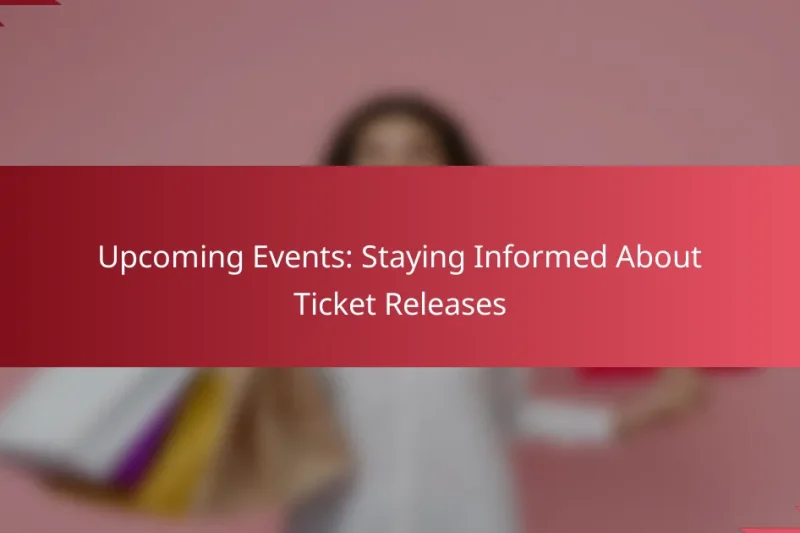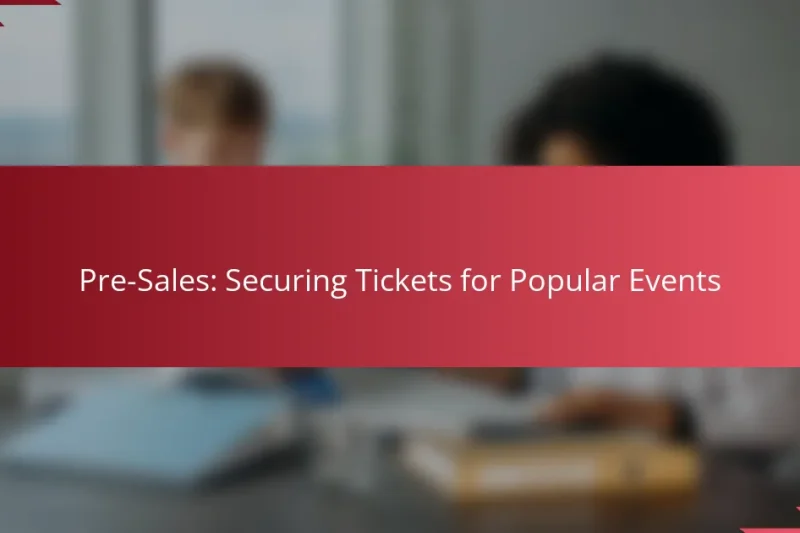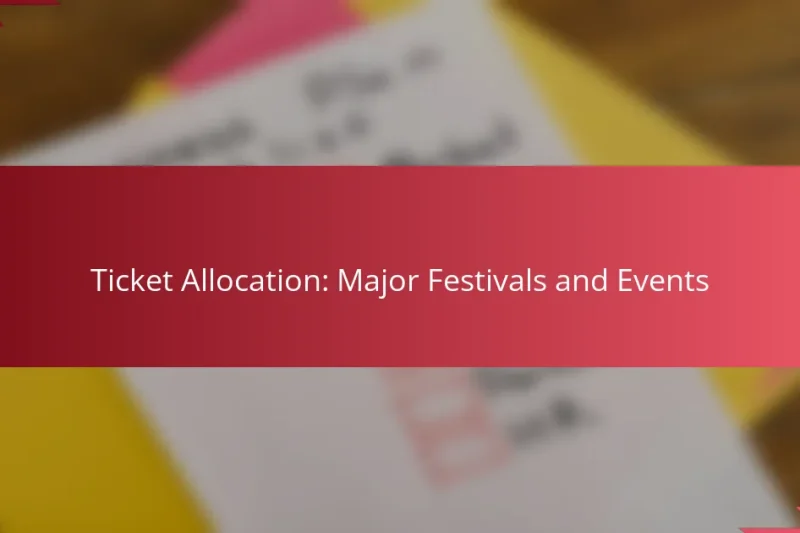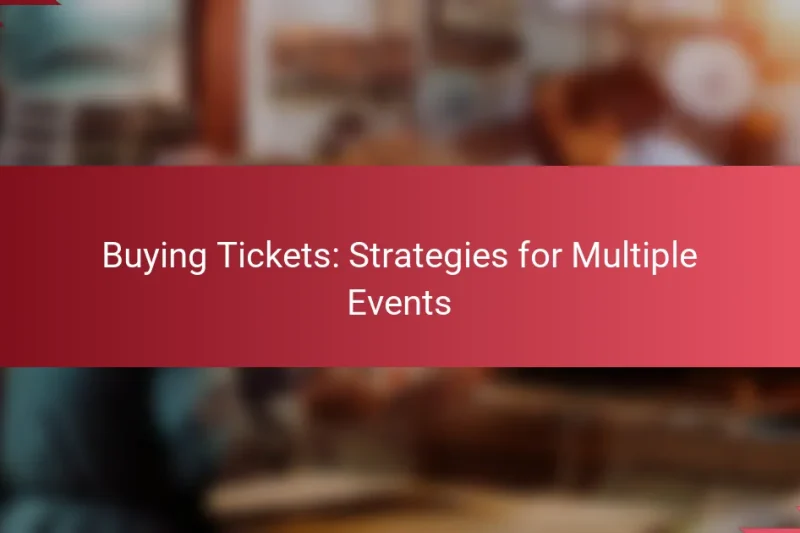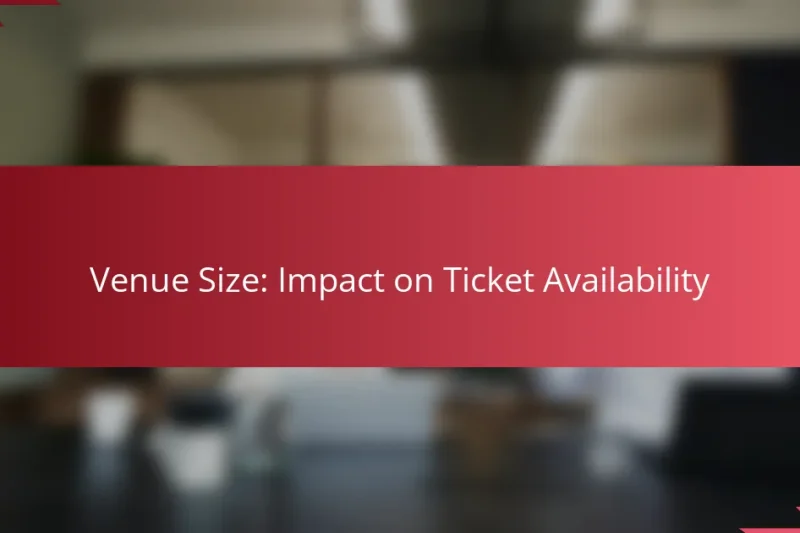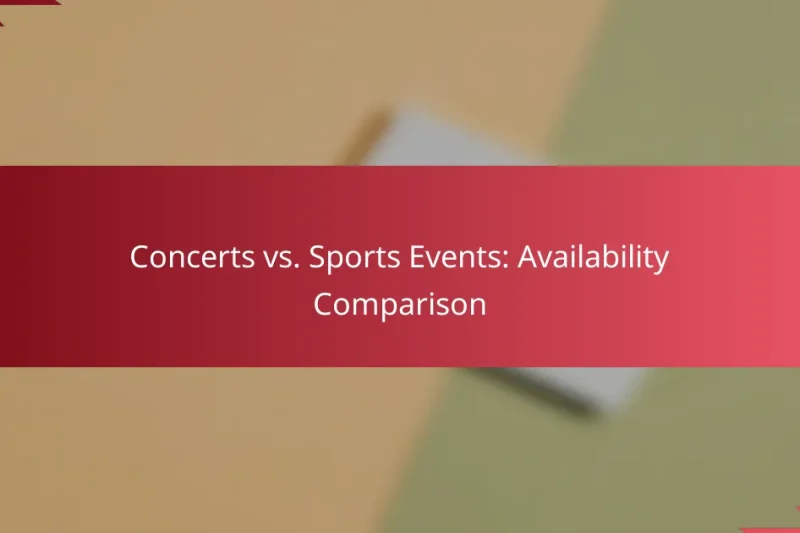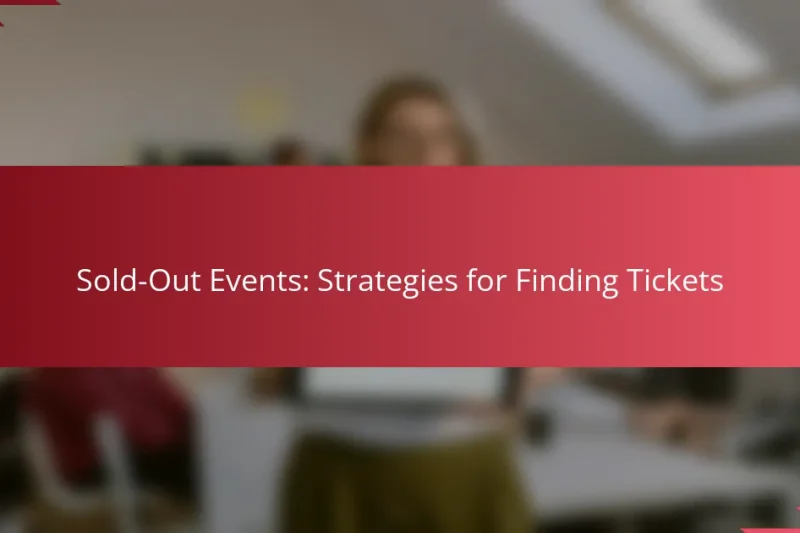Staying informed about upcoming events is crucial for securing tickets to your favorite shows and activities. … Upcoming Events: Staying Informed About Ticket ReleasesRead more
Event Types and Ticket Availability
Understanding the various types of events and their ticket availability is crucial for anyone looking to experience live entertainment. Major cities offer a wide array of options, from concerts and theater performances to sporting events and festivals. To secure the best tickets, it’s important to explore multiple sources and stay informed about pricing and availability.
Pre-Sales: Securing Tickets for Popular Events
Securing tickets for popular events in major cities requires a strategic approach to enhance your chances … Pre-Sales: Securing Tickets for Popular EventsRead more
Ticket Allocation: Major Festivals and Events
Securing tickets for major festivals and events requires prompt action and strategic planning, as popular gatherings … Ticket Allocation: Major Festivals and EventsRead more
Buying Tickets: Strategies for Multiple Events
Buying tickets for multiple events can be an exciting yet challenging task, especially in bustling cities … Buying Tickets: Strategies for Multiple EventsRead more
Venue Size: Impact on Ticket Availability
Venue size plays a crucial role in determining ticket availability, as smaller venues limit the number … Venue Size: Impact on Ticket AvailabilityRead more
Concerts vs. Sports Events: Availability Comparison
When comparing availability for concerts and sports events, concerts tend to offer more options, especially in … Concerts vs. Sports Events: Availability ComparisonRead more
Sold-Out Events: Strategies for Finding Tickets
Finding tickets for sold-out events can be a daunting task, but with the right strategies, you … Sold-Out Events: Strategies for Finding TicketsRead more
What types of events are available in major cities?
Major cities typically host a diverse range of events, including concerts, theater performances, sporting events, festivals, and conventions. Each type of event offers unique experiences and attracts different audiences, making it essential to understand what is available in your area.
Concerts
Concerts are live music performances that can range from small local acts to large international tours. They often take place in venues such as stadiums, arenas, and outdoor parks. Ticket prices can vary widely, from affordable options in the low tens of dollars to premium experiences costing hundreds.
When attending a concert, consider the genre of music and the venue’s capacity, as these factors can significantly affect the atmosphere. It’s advisable to purchase tickets early, especially for popular artists, as they can sell out quickly.
Theater performances
Theater performances encompass a variety of shows, including plays, musicals, and operas. Major cities often have dedicated theaters that showcase both local talent and touring productions. Ticket prices typically range from budget-friendly to high-end, depending on the show’s popularity and seating choice.
When planning to attend a theater performance, check for discounts on matinee shows or group bookings. Arriving early can enhance your experience, allowing time to enjoy the venue and find your seat comfortably.
Sporting events
Sporting events include professional and amateur competitions across various sports, such as football, basketball, and soccer. Major cities often have dedicated teams and stadiums, creating a vibrant atmosphere for fans. Ticket prices can vary based on the sport, team popularity, and seating location.
Consider attending games during the regular season for more affordable tickets, as playoff games can be significantly pricier. Arriving early can also help you avoid traffic and enjoy pre-game festivities.
Festivals
Festivals celebrate culture, food, music, and art, attracting large crowds and offering a variety of activities. They can be annual events or seasonal gatherings, featuring local vendors, performances, and workshops. Admission fees can range from free to moderate, depending on the festival’s scale and offerings.
To maximize your festival experience, plan your visit around the schedule of events and consider purchasing tickets in advance for popular attractions. Be prepared for large crowds and varying weather conditions, especially for outdoor festivals.
Conventions
Conventions are large gatherings focused on specific interests, such as technology, gaming, or pop culture. They often feature panels, workshops, and vendor exhibits, providing networking opportunities for attendees. Ticket prices can vary widely, from affordable day passes to more expensive full-event packages.
When attending a convention, review the schedule in advance to prioritize sessions and activities of interest. Booking accommodations early is advisable, as nearby hotels can fill up quickly during major events.
How to find ticket availability for events?
To find ticket availability for events, start by checking multiple sources to ensure you get the best options. Availability can vary widely based on the event type, location, and demand, so exploring various platforms is essential.
Online ticket platforms
Online ticket platforms like Ticketmaster, Eventbrite, and StubHub are popular for checking ticket availability. These sites aggregate listings from various events, allowing you to compare prices and seating options easily. Be aware that service fees can add to the ticket price, so factor that into your budget.
When using these platforms, set up alerts for specific events to receive notifications when tickets become available. This can be particularly useful for high-demand events where tickets sell out quickly.
Official event websites
Official event websites often provide the most accurate and up-to-date information on ticket availability. They typically sell tickets directly, which can help you avoid additional fees charged by third-party platforms. Always check the official site first to ensure you are purchasing legitimate tickets.
In addition to ticket sales, these sites may offer exclusive promotions or early access to tickets for subscribers. Signing up for newsletters can keep you informed about upcoming events and ticket releases.
Mobile apps
Mobile apps for ticket sales, such as SeatGeek and Ticketmaster’s app, provide a convenient way to check ticket availability on the go. These apps often feature user-friendly interfaces and can send push notifications for ticket releases or price drops, ensuring you stay updated.
When using mobile apps, consider enabling location services to find events near you quickly. Additionally, some apps offer mobile-only discounts, making them a cost-effective option for purchasing tickets.
What are the best practices for purchasing tickets?
To purchase tickets effectively, follow a few key practices that enhance your chances of securing the best deals. These include comparing prices, checking for presale opportunities, and setting alerts for ticket releases.
Compare prices across platforms
When buying tickets, it’s crucial to compare prices across various platforms. Different websites may offer varying prices for the same event, so checking multiple sources can save you money. Popular platforms include Ticketmaster, StubHub, and Live Nation.
Consider using price comparison tools or apps that aggregate ticket listings, allowing you to see the best deals quickly. Additionally, be aware of any service fees that may apply, as these can significantly affect the total cost.
Check for presale options
Presale options can provide early access to tickets before they are available to the general public. Many venues and artists offer presales to fans who sign up for newsletters or follow them on social media. This can be a great way to secure tickets for high-demand events.
To take advantage of presales, keep an eye on announcements and register for alerts. Some credit card companies also offer exclusive presale opportunities, so check if your card provides this benefit.
Set alerts for ticket releases
Setting alerts for ticket releases ensures you are notified as soon as tickets become available. Many ticketing websites and apps allow you to create alerts based on your preferences, such as event type or location.
Utilize these features to stay ahead of the competition, especially for popular events. Consider setting alerts for multiple platforms to maximize your chances of getting tickets at the best price.
What factors affect ticket prices?
Ticket prices are influenced by various factors including event popularity, seating location, and the timing of your purchase. Understanding these elements can help you make informed decisions and potentially save money when buying tickets.
Event popularity
The popularity of an event significantly impacts ticket prices. High-demand events, such as major concerts or championship games, often see prices soar due to limited availability and high interest. For instance, tickets for a sold-out concert can be several times more expensive than for a less popular local show.
When considering purchasing tickets, check the event’s popularity through social media buzz, ticket sales data, or reviews. This can give you insight into whether prices are likely to rise or fall as the event date approaches.
Seating location
Seating location plays a crucial role in determining ticket prices. Generally, seats closer to the stage or field command higher prices compared to those further away. For example, front-row seats at a theater or center-court seats at a basketball game can be significantly more expensive than seats in the back or off to the side.
When buying tickets, evaluate the seating chart and consider your budget. Sometimes, choosing seats that are slightly further away can lead to substantial savings while still providing a good view of the event.
Time of purchase
The timing of your ticket purchase can greatly affect the price you pay. Tickets are often cheaper when they first go on sale, but prices may increase as the event date approaches, especially if demand is high. Conversely, last-minute purchases can sometimes yield discounts if sellers are eager to fill seats.
To maximize savings, monitor ticket release dates and set reminders for when they go on sale. Additionally, consider purchasing tickets during off-peak times, such as weekdays, when demand may be lower.
How do local regulations impact ticket sales?
Local regulations significantly influence ticket sales by dictating the rules around pricing, refunds, and resale. These laws can vary widely between regions, affecting how events are marketed and how consumers can purchase tickets.
Refund policies
Refund policies are often governed by local laws, which may require event organizers to offer refunds under specific circumstances, such as event cancellations or significant changes in event details. In many jurisdictions, consumers have the right to a full refund if an event is canceled, while partial refunds may be offered for rescheduled events.
It is essential for consumers to review the refund policy before purchasing tickets, as some events may have stricter terms. For example, a concert may allow refunds only within a certain timeframe, while a sports event might have a no-refund policy unless the game is canceled.
Resale restrictions
Resale restrictions can vary by location and may limit the ability to sell tickets on secondary markets. Some areas have laws that prohibit the resale of tickets above face value, while others may require sellers to obtain a license to resell tickets legally.
Consumers should be aware of these regulations to avoid potential fines or invalidated tickets. For instance, in some states in the U.S., selling tickets for more than their original price without proper authorization can lead to legal consequences. Always verify local laws before attempting to resell tickets.
What are the emerging trends in event ticketing?
Emerging trends in event ticketing include the adoption of dynamic pricing models, increased use of technology for ticket distribution, and a focus on personalized experiences for attendees. These trends reflect the growing demand for flexibility and efficiency in how tickets are sold and managed.
Dynamic pricing models
Dynamic pricing models adjust ticket prices based on real-time demand and supply conditions. This approach allows event organizers to maximize revenue by increasing prices as demand rises, especially for popular events, while offering lower prices during periods of low demand.
For example, a concert may start with tickets priced at $50, but as the event date approaches and demand increases, prices could rise to $100 or more. This strategy can help ensure that tickets are sold at optimal prices, but it may also lead to customer dissatisfaction if prices fluctuate significantly.
When implementing dynamic pricing, organizers should consider setting clear guidelines for price changes and communicate these to potential buyers. Transparency can help mitigate frustration and build trust with the audience, ensuring they understand the rationale behind price variations.
